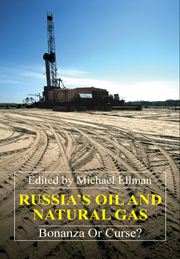Book contents
- Frontmatter
- Contents
- List of Tables and Figures
- Preface
- A Overview
- B Financial Flows
- C Economic Policy Issues
- 5 Sustaining Growth in a Hydrocarbon-based Economy
- 6 The Road to Spontaneous Diversification
- 7 Economic Growth and the Mobilization Model
- 8 The Importance of Geography
- D Political Issues
- List of Contributors
- Index
- More Titles in the Series
7 - Economic Growth and the Mobilization Model
from C - Economic Policy Issues
Published online by Cambridge University Press: 05 March 2012
- Frontmatter
- Contents
- List of Tables and Figures
- Preface
- A Overview
- B Financial Flows
- C Economic Policy Issues
- 5 Sustaining Growth in a Hydrocarbon-based Economy
- 6 The Road to Spontaneous Diversification
- 7 Economic Growth and the Mobilization Model
- 8 The Importance of Geography
- D Political Issues
- List of Contributors
- Index
- More Titles in the Series
Summary
Introduction
The evaluation of the current situation and prospects of the contemporary Russian economy in the Russian and Western economic literature and in the activities of the international economic organizations is complicated by two factors. First, Russian economic statistics remain unreliable. Second, the overwhelming majority of researchers make forecasts of Russian long-term economic development based on the results of the last few years, at the most of the past 10–20 years. Furthermore, these forecasts are based on purely economic factors, without taking account of the human potential and moral condition of the society.
My goal is to evaluate the prospects for Russian economic development on the basis of reliable economic statistics and on the main features of its economic development over the past three hundred years, for which period there are more or less reliable macroeconomic statistics. In the economic development of Russia in this period one can observe some regularities that enable one to forecast the future development of Russia and its economic policy. I attempt also, to the extent that is possible, to take account of the human potential and moral condition of contemporary Russian society.
Contemporary Russian Macroeconomic Statistics and the Need for Alternative Estimates of the State of the Russian Economy
Despite the fact that the Russian statistical service since the beginning of the 1990s has declared its transition to international statistical standards, Russian macroeconomic statistics remain unreliable.
- Type
- Chapter
- Information
- Russia's Oil and Natural GasBonanza or Curse?, pp. 151 - 172Publisher: Anthem PressPrint publication year: 2006
- 1
- Cited by



